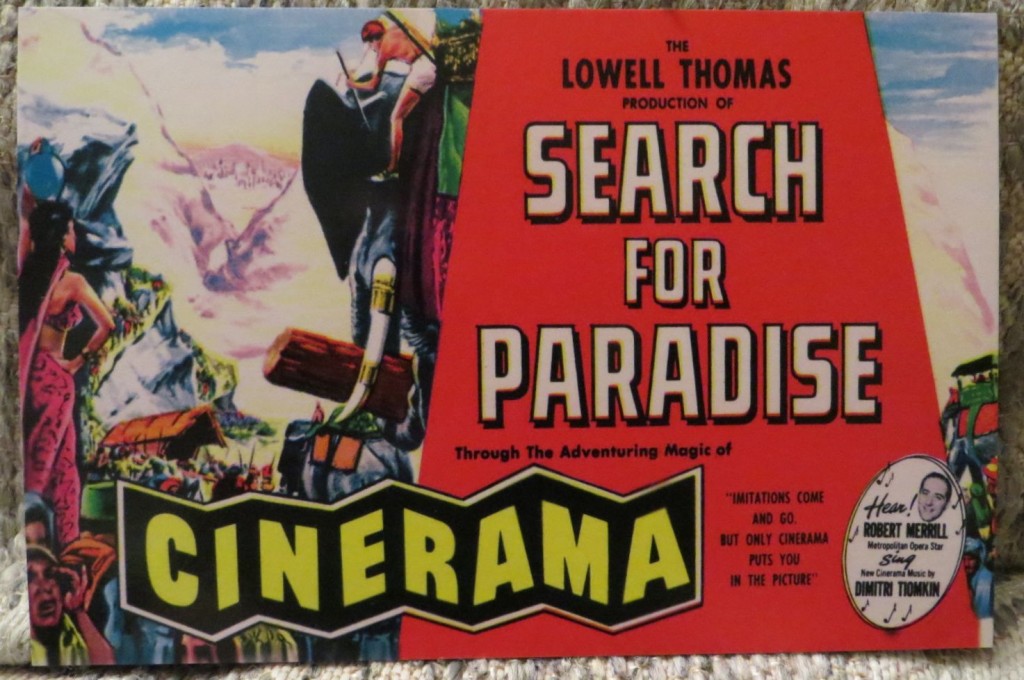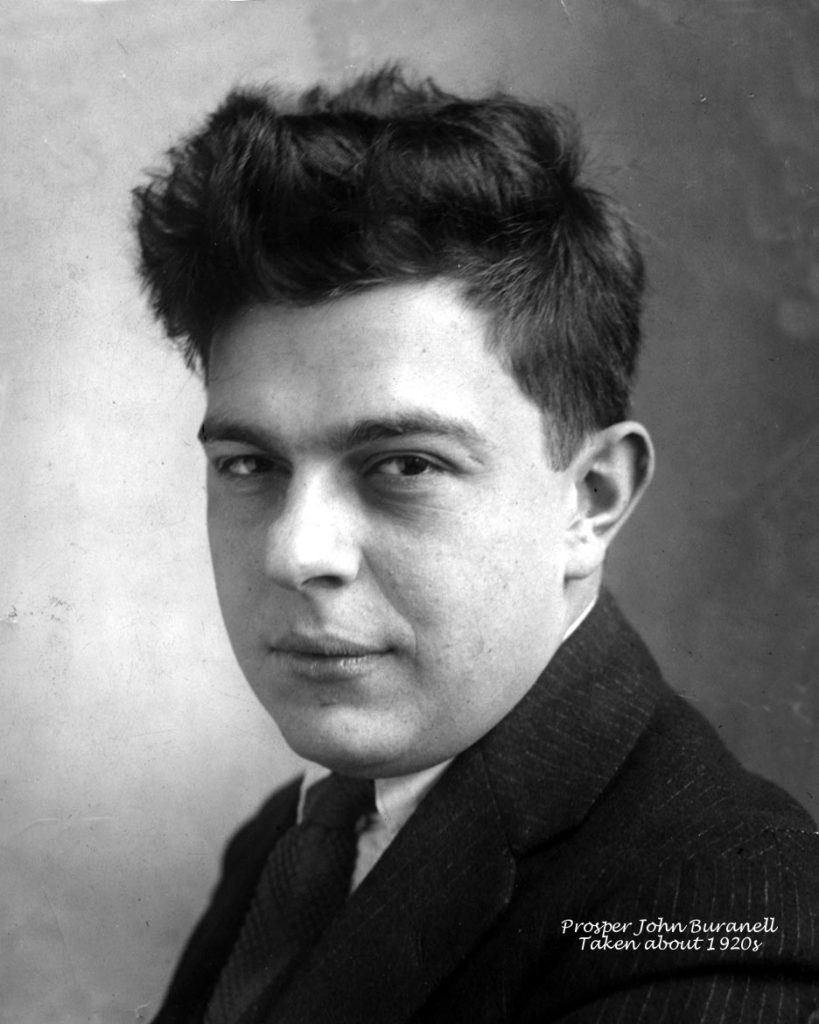by Warren M. Sherk
For ages, pursuit of a book contract meant first writing a proposal and a sample chapter. Sometime before the publication in 1959 of Please Don’t Hate Me, Dimitri Tiomkin’s autobiography written with Prosper Buranelli, a sample chapter was circulated.
“Chapter 1” of Hollywood Harmonies was preceded by a two-page Preface. Here, in its entirety, is the original lead-in by Buranelli to the proposed book. The published version has no such introduction.
PREFACE
You may hear it said of some one – that he has known everybody. Add the spice of contrast and say – he has known everybody in the world of top-lofty music and in Hollywood. That describes Dimitri Tiomkin, composer of music for motion pictures, repeated winner of Academy Awards, the treasured Oscars, and one of the rare characters of movieland. He talks in the idiom of anecdote, personalities, the absurd twist of events, the droll peculiarities of people. This maestro of the films can appear as Tiomkin, storyteller.
I had occasion to work with Dimi, as he is known in Hollywood studios, and become acquainted with this mercurial and exceedingly Russian whim and wisdom. Dimi stands at middle height with pale features capable of a pathetic dolor at one moment and bacchanalian glee at the next. He has a classic Russian accent and inimitable turns of speech. Of these there are two recurrent themes, always uttered with fervor and in the oddest places. One, “don’t hate me,” or “now you will hate me.” The other, “I must tell the truth”, or “I must be honest.” These Tiomkinisms add a unique flavor to Dimi’s already flavory and his abundant conversation.
Then there’s Albertina. Mrs. Tiomkin was Albertina Rasch, prima ballerina of New York’s Metropolitan Opera in its golden days, who later had a nation-wide career in ballet. She, too, is a fancier of the oddities of the great and the small in the human curio shop, and can supplement x Dimi in a tale of comical people.
The work with Tiomkin mentioned above was in connection with the 1957 Cinerama documentary, Search for Paradise, produced by broadcast journalist Lowell Thomas, best known as the Voice of America for his film, television, and radio work. For Search for Paradise, Buranelli collaborated with Thomas and director Otto Lang on the scenario and narration and Tiomkin wrote the music score. “‘Search for Paradise’ is another fine demonstration of Cinerama’s ability to capture episodes and locations real enough to impart to the viewer a sense of participation,” wrote a Motion Picture Daily reviewer. “Dimitri Tiomkin composed and conducted the excellent score.”
READ: Search for Paradise soundtrack issued

Prosper Buranelli spent the majority of his adult life as a creative aide to Lowell Thomas, notably writing narration for Thomas to read in his role as announcer for Fox Movietone News.
Lowell Thomas said of Buranelli, “He was one of the most amazing men of our time and I rank him among all the remarkable men I’ve ever met, including prime ministers and kings.”

Buranelli’s first name was derived from “Prospero,” the protagonist in Shakespeare’s The Tempest; he ghost wrote for Thomas and others; he penned his own novel, a mystery thriller titled News Reel Murder, centered around a commentator who resembles Lowell Thomas; he fathered at least 8 children; he was a “walking encyclopedia” and “brilliant conversationalist”; and he preferred Murads, hand-rolled cigarettes filled with Turkish tobacco.
BUY THE BOOK: News Reel Murder listing on ebay
In spirit, “Chapter 1” of Hollywood Harmonies does not differ greatly from the opening chapters of Please Don’t Hate Me, both largely centered around the Conservatory in St. Petersburg and the influence of composer Alexander Glazunov on Tiomkin. In one, Tiomkin lives with the Kohansky family and in the other it’s Koliansky. The opening sentence of Hollywood Harmonies, “Glazunov makes me wonder – what did he look like naked? It was impossible to guess” (makes me think of Balzac sculpted by Rodin) is replaced by “St. Petersburg of the Tsars was a city of splendor and strangeness,” in Please Don’t Hate Me. That sentiment appears in Hollywood Harmonies as “Also I began to feel the enchantment of St. Petersburg, a city of splendor and strangeness.” The sample chapter concludes with, “But Glazunov loved fugue and taught it well, and today I am happy if, in writing music for a motion picture, I can sneak in a fugue.* Now I know that you hate me.” Soon, Please Don’t Hate Me became the publication’s title.
*For an example, listen to music from The Well on disc 3, track 2 of The Alamo: Dimitri Tiomkin: The Essential Film Music Collection, for a fugue that begins around two-and-a-half minutes into the cue. (Other composers have snuck fugues into their scores, my favorite is Franz Waxman’s chase fugue, “Farewell and Frenzy,” heard in A Place in the Sun.)
Buranelli left his birth state of Texas to become a composer, according to one account. Once in New York, magazine and newspaper writing won out. Writing and editorial work at the New York World introduced him to crosswords. As a result, Buranelli, with Margaret Petherbridge, was responsible for the world’s first Crossword Puzzle Book. That was the title of the hit Simon and Schuster book published in 1924 that spawned a puzzle-solving mania in America that continues to this day. Within a year, $20,000 in royalties poured in. One commentator wrote, “If you want to make money, plan something that will help countless people kill the time which hangs heavy.” Buranelli didn’t live to see the October 1966 issue of Boys’ Life that included “Crossword,” a history of the phenomena that documents his influential contribution. Margaret Petherbridge married John Farrar, founder of Farrar, Straus and Giroux, and as Mrs. Margaret Farrar became the crossword puzzle editor for the New York Times.
Articles such as “The Castaways of the Damaru,” edited by Buranelli and “Capt. Dyott Learns Jungle Diplomacy in Land of Head Hunters” appearing in the Cincinnati Commercial Tribune on June 11, 1922, and August 1, 1926, respectively, are precursors to his future work for world explorer Lowell Thomas. The latter article is by Commander Dyott “As Told to Prosper Burnelli [sic].” The exotic adventures of Dyott were soon replaced with those of Thomas and his associates.
Buranelli assisted Thomas in writing a biographical account of the life of Count Felix Von Luckner, a war veteran who led a German ship through a British blockade, published in 1927. When Count Luckner docked his yacht in Kingston, Jamaica, in August 1929, guests aboard included Mr. and Mrs. Lowell Thomas and Prosper Buranelli.

For the next 30 years, Buranelli and Lewis Sherwin alternated writing “staccato scripts” for Thomas’s daily CBS radio broadcasts that began on September 29, 1930. Buranelli mastered the art of “writing like Lowell spoke,” as Mitchell Stevens states in The Voice of America: Lowell Thomas and the Invention of 20th-Century Journalism, and Buranelli and Sherwin “qualify as among the first broadcast newswriters.” Buranelli’s 1940 book, News Reel Murder, was dedicated to a producer of Fox Movietone News, Truman Talley, “In whose workshop of motion pictures I learned about newsreel.” The book’s opening line reads, “The movies are O.K. when you’ve got nothing else to do, and I used to like the News Reel.”
Buranelli died on June 19, 1960, a year after Please Don’t Hate Me was published, on Thomas’s sprawling Hammersley Hill estate situated on Quaker Hill in Pawling, New York.
Mary [Richmond] Davis, Lowell Thomas’s longtime secretary, immediately sent a letter to Tiomkin in London informing him of Buranelli’s death. Albertina [Rasch] Tiomkin wrote to Davis, “Dimitri tells me he received your letter in London. It was a terrible shock to him anyway, but that was the best way to break the news.”

The New York Times book critic Harold C. Schonberg referred to the book as “slight, amusing and unpretentious” in his mixed review, writing, “Otherwise the book is full of pleasant moments.”
Check back in March for our feature article on Lowell Thomas and Dimitri Tiomkin.
Sources
“Value of Spare Time,” San Antonio Express, December 18, 1925
“Famous Sea Raider of World War Here,” Kingston Daily Gleaner, August 15, 1929
“Adventurer in Top Hat,” by Berton Braley, Radio Mirror, vol. 11, no.3 , January 1939
“Along the Rialto,” by Phil M. Daly, The Film Daily, November 18, 1940 [bit on “News Reel Murder”]
“Search for Paradise,” Motion Picture Daily, September 25, 1957 [film review]
“The Man Gets Around,” by Harold C. Schonberg, New York Times, November 8, 1959
“Prosper Buranelli, Aide of Lowell Thomas, Dead,” New York Times, June 20, 1960 [obituary]
“Pioneer in Crossword,” Kansas City Times, June 20, 1960 [Buranelli obituary]
“Crossword Founder Succumbs,” Long Beach Independent, June 20, 1960 [Buranelli obituary]
Albertina Tiomkin to Miss Mary Davis, June 24, 1960
The Voice of America: Lowell Thomas and the Invention of 20th-Century Journalism by Mitchell Stephens, New York: St. Martin’s Press, 2017

